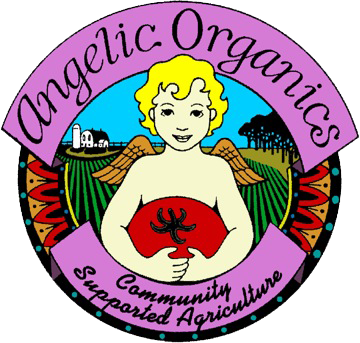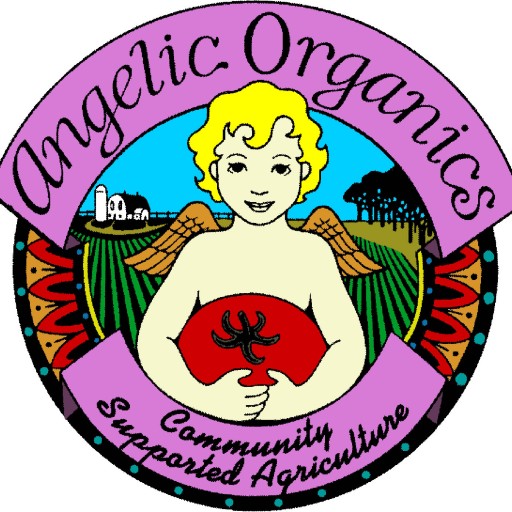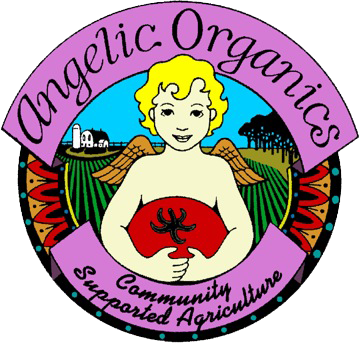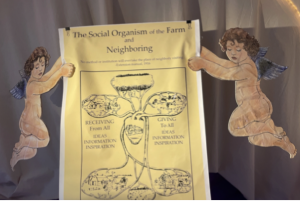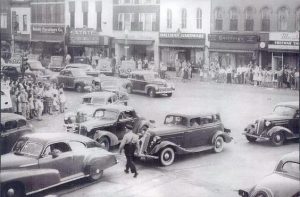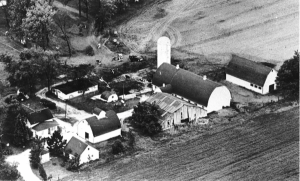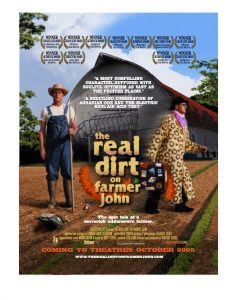Farmer John Writes: Do You Love Farms?
Harvest Week 3, July 18th – 23rd, 2022
A Love for Farms
My parents were in love with farms. When we travelled, they always commented on the crops in the fields, the farmsteads, the livestock in the farmyards. My mom would often film the rural landscape with her 8 mm camera. Always, when we visited another farm, it included a tour of the barns.
Up until the 1970’s or so, farms were economic centers—they produced wealth— and they were cultural hubs—they were often centers of hospitality, of social life. One could stop in at pretty much any farm for a visit, a cupcake, a bowl of ice cream. In addition, farms often combined resources with other farms in the exchange of labor and equipment.
There was a commonality amongst the farmers. They all had sheds and livestock, grain and hay, machinery, upkeep, bills, taxes, weather and prices for their products. They pondered the best variety of seed oats, the highest yielding corn variety, the hardest plowshares, the best laying hens, the most enduring hedgerows, the many ways to hang a gate, build a fence, fill a dead furrow. They debated when to wean a calf, plant beans, trade a combine, how deep and how thick to plant the corn. Every farm, of course, was individualized, but at the same time, there was a unity amongst them, amongst the farmers.
And then there were the farm towns nearby. From my story, The Way We Whir:
“I paid for the Sears tractor battery with a check. I was at the Beloit Mall and the battery salesman said, ‘Peterson, huh? Was Albert your grandfather?’
“Yup.”
“He used to bring crates of pigeons into Beloit. Pigeons were quite a treat back then. He always got a good price for ‘em, too.”
“Yeah, I still see ‘em flying around his barn, even though he died twenty years ago,” I replied.
“I used to help… out there – must be forty or fifty years back.” The salesman paused for a moment. “And your gramma always made us come in for coffee and cookies afterwards. She wanted the gossip from town. Everyone loved your gramma.”
‘Beloit was once a farm town. Farmers traded on Saturday nights and Saturday nights were hot. Pool halls and ballrooms were booming. Townspeople and farm folk hollered and gambled, danced, swapped goods and gossip. There were shoe shine stands and smoke shops, and my uncle Harold shot a pool ball so hard it stuck in the wall.’
‘By the time I was five and could remember, Saturday night took place on Saturday mornings, and cars were parked three deep on the streets downtown. Farm hands spent their paychecks on pleated trousers, white buck shoes and engraved adjustable rings to give their girls. I came in every Saturday… to read the comic books that fluttered on the outside rack next to the shoe shine stand where the shoe shine man finally learned my name.’
end of excerpt from The Way We Whir
What Happened?
Around 9:15 or so in the morning, back in the 70’s, various neighbors and I would converge at the farm next door for fifteen minutes of doughnuts, coffee and laughs. One morning, the farmer announced “no more coffee and doughnuts from now on—too expensive.” A blow to community life.
We offered to chip in on the costs, and the answer was “no.” I don’t think it was about the costs. It was about the general decline of social life on the farms.
As farms grew in size and secured more access to technology and capital, they became more independent, more autonomous, and, in the course of expanding acreage, more competitive.
Video excerpt from the film The Real Dirt on Farmer John, The Roofs Go: www.youtube.com/watch?v=t-g4FnV2-So
Today
Today, farms (the few that remain) are more so economic centers–centers of production–and less centers of hospitality. I realize there are many exceptions to this generalization, but overall, I feel it has validity.
I do not claim that Angelic Organics farm is a model of hospitality, mostly due to the tremendous, ongoing work demands of running the farm. I lament the astonishing busyness of the farm, and how just a few minutes of social interaction can throw off a whole work day.
I read about a Mennonite decree that farms could mechanize more. A Mennonite farmer broke down and wept. “Now I won’t have a natural way of interacting with my neighbor,” he said. “There won’t be that need we have for one another to share in the fieldwork. I feel like I will lose a friend.”
Of course, Angelic Organics still embraces a cultural impulse in various ways– through design of the farmstead, levity in the workplace, occasional gatherings of shareholders, and the writing of this newsletter. I just want it be be more that way. I dream of a hospitality person on our staff, who is on call to offer guests treats and tours.
Your Farm
Many of you know that there is a feature film about your farm, The Real Dirt on Farmer John, winner of 31 festival awards. I recently came across a list by film critic Rose McQuirter titled Ten Best Movies Set on a Farm. The Real Dirt on Farmer John made Rose’s list.
I noticed that this is the only film on the list that is a documentary; all the other films are fiction. I guess I have had enough drama in my real life to lead to a film that is as interesting as fiction films about farming. I’m not sure that’s a good thing overall, but the drama did get the film about the farm and me onto this list; it even ranked #4.
“The 2005 documentary The Real Dirt on Farmer John follows the real life of a unique and eccentric farmer, John Peterson, a big producer at Angelic Organics in Caledonia, Illinois. Over the course of the delightful film, audiences witness John make his farm successful despite a difficult economy and rumors being spread about him. John provides reality’s version of the farmer, a sometimes larger-than-life man who is often more interesting than fictional portrayals of farmers, and a man who was born to take care of the land.”
You can stream The Real Dirt on Farmer John for free from www.angelicorganics.com/watch-the-movie
Why a Movie?
Part of why I was willing to have a film made about the farm and myself was to share with audiences that a farm is more than just a source of food, more than a place of production. A farm is a mecca, a being, host to birds, insects, trees, flowers, microorganisms, soil, buildings, machinery, animals, crops, and people. It is a place where romance bursts forth, because dirt and sweat, like love, are true and good. A farm is a wondrous place, a confluence of nature and humanity.
Please keep in mind when you open your box that you are part of the being of the farm.
Warmly,
Farmer John
